I'm originally from Ireland, and consider myself Irish, and not British, but I still use the term 'British Isles' because it's commonly accepted outside of Ireland, and it does have a decent history as more or less being an English form of the Greek name for the region (something in English rendered as the Pretanic Islands), which long predates the British Empire and so on. Of all the things to rightly complain about, I always found that one kind of silly. There's also Septemtrionalis Oceani Insulae, but that includes some other islands.
The British Isles Map Mod
- Thread starter Kurek
- Start date
-
We have updated our Community Code of Conduct. Please read through the new rules for the forum that are an integral part of Paradox Interactive’s User Agreement.
You are using an out of date browser. It may not display this or other websites correctly.
You should upgrade or use an alternative browser.
You should upgrade or use an alternative browser.
Lists provinces OK, but the chronology of Scottish expansion here is misleading and/or out of date and/or based on no actual historical evidence, and Galloway was never part of Strathclyde (commonly assumed for some reason, but has never been argued for nor is there any evidence.)
I wouldn't have expected any other reaction
Kurek, now that I seem to have gotten the map editor to work, I've got a question for you.
You seem to be more interested in the British Isles, whereas I want to do some other modifications and just keep Wales as you did it.
May I use your Wales map as a base for my own map modification? You will of course get credit for Wales if I manage to come to a releasable version.
You seem to be more interested in the British Isles, whereas I want to do some other modifications and just keep Wales as you did it.
May I use your Wales map as a base for my own map modification? You will of course get credit for Wales if I manage to come to a releasable version.
Aye, feel free to use my map in your own, I don't mind at all. Good luck with the map editing and stuff, I find it's not really that hard just really bloody tedious. And as for them Scots maps and stuff, I'll examine them more when I'm not drinking a bottle of Claret, now it's time for fine music and more booze!
After a hedonistic weekend+ I have returned to map work. Almost there with Ireland, a lot of stuff I'm not happy with but I'll release a test version hopefully later today.
Anyway here's a screenshot:
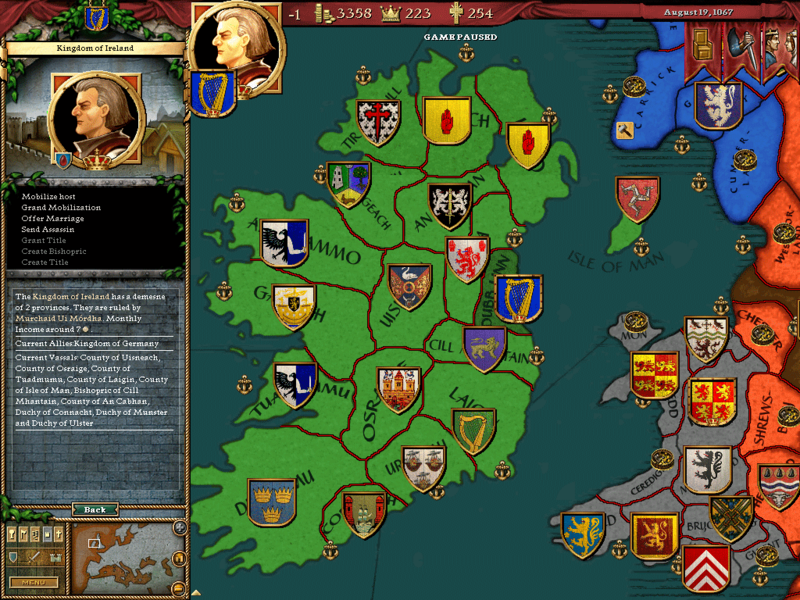
Yes a lot of cheating was involved, but it's purely for demonstrative purposes so that's alright.
Anyway here's a screenshot:

Yes a lot of cheating was involved, but it's purely for demonstrative purposes so that's alright.
Bah, a ton of errors are cropping up, database mismatch ones I believe and I'm sure I've removed any duplicate claims that I may of accidentally copied over. File editing was never my strong point.  I'll revert back to some earlier files I have archived and work my way back up again I guess.
I'll revert back to some earlier files I have archived and work my way back up again I guess.
county/duchy namea
Since you have all the irish and welsh counties with there celtic names, will you do the same for Alba & Mann
e.g. Western Isles = Eileanan an Siar
Isle of Mann = Ellan Vannin
Galloway = Gallobha
Gallaibh = Caithness
Sutherland = Cataibh
Meath = Míde/Mí/an Mhí
and maybe we could have kingdom names
"Ríocht na hÉireann"(irish)
"Ríoghachd na hAlba"(scots gaelic)
# "Reeaght Vannin as ny hEllanyn"(manx) or
"Ríoghachd Mhananain agus na t-Eileanan(scots gael)
# "Teyrnas chan Cymru"(welsh)
#need confirmation
Since you have all the irish and welsh counties with there celtic names, will you do the same for Alba & Mann
e.g. Western Isles = Eileanan an Siar
Isle of Mann = Ellan Vannin
Galloway = Gallobha
Gallaibh = Caithness
Sutherland = Cataibh
Meath = Míde/Mí/an Mhí
and maybe we could have kingdom names
"Ríocht na hÉireann"(irish)
"Ríoghachd na hAlba"(scots gaelic)
# "Reeaght Vannin as ny hEllanyn"(manx) or
"Ríoghachd Mhananain agus na t-Eileanan(scots gael)
# "Teyrnas chan Cymru"(welsh)
#need confirmation
Thanks for the naming suggestions. I've not really thought about what to name Scots stuff, could also go with the Lallans  Oh and speaking of which I've not thought of names for Duchies in Ireland, maybe they could be changed, and the Kingdom name, same with Wales as well. Interesting, I'll think about that.
Oh and speaking of which I've not thought of names for Duchies in Ireland, maybe they could be changed, and the Kingdom name, same with Wales as well. Interesting, I'll think about that.
Anyway finally sorted out the problems with the Ireland map, got it working in a basic state but with no new characters or anything, just the four new provinces assigned to neighbours, but unlike with the Welsh one I shan't release it like this, I'll add some characters and stuff tomorrow, well try to anyway. But now I'm bloody tired.
Anyway finally sorted out the problems with the Ireland map, got it working in a basic state but with no new characters or anything, just the four new provinces assigned to neighbours, but unlike with the Welsh one I shan't release it like this, I'll add some characters and stuff tomorrow, well try to anyway. But now I'm bloody tired.
modern irish translation
Ulster = Uladh
Leinster = Laigin
Munster = an Mhumhain
Connaught = Connacht
Breifne = Breifne
Meath = Míde/an Mhí
King = Rí
Queen = Banríon
Duke = Diúc
Duchess = Bandiúc
Count = Cuntais
Countess = Cuntaois
Kingdom = Ríocht
Duchy = Diúcacht
County = Contae
Ulster = Uladh
Leinster = Laigin
Munster = an Mhumhain
Connaught = Connacht
Breifne = Breifne
Meath = Míde/an Mhí
King = Rí
Queen = Banríon
Duke = Diúc
Duchess = Bandiúc
Count = Cuntais
Countess = Cuntaois
Kingdom = Ríocht
Duchy = Diúcacht
County = Contae
czam2007 said:modern irish translation
Ulster = Uladh
Leinster = Laigin
Munster = an Mhumhain
Connaught = Connacht
Breifne = Breifne
Meath = Míde/an Mhí
King = Rí
Queen = Banríon
Duke = Diúc
Duchess = Bandiúc
Count = Cuntais
Countess = Cuntaois
Kingdom = Ríocht
Duchy = Diúcacht
County = Contae
Title names and region names are irrelevant because they can't be assigned by culture, but only by religion, except in the case of Turks for some bloody reason. Besides that, modern names of feudal titles don't seem the best to me when we know plenty about Gaelic naming caveats and political structure for the period. Native Irish didn't use titles like Duke and such for themselves (seriously, how lame would it be to start in 1066 with a Duke of Munster? ...Heeey...), and, if the option existed, it'd make more sense to use native titles, though to my understanding, the point is moot since it can't be done.
Period names were, for kingdoms;
Ulster - Ulaidh (or Cúige Uladh, but the 'fifth' names would seem a bit funny looking to me)
Leinster - Laigin (this one hasn't changed much in some ungodly period of time, but the modern standard Irish spelling is Laighin anymore, at least, how my nephews are learning it)
Munster - Mumha
Connacht - Connacht (or Connachta, this name has also changed very little, except for a period the anglicized version was Connaught, but, not so much anymore)
Meath - Mide or Midhe, typically unaccented in period (into the modern era, lots of fadas got added into the language)
Also, on the full titles of kingdoms in native languages, that would also imply one would need to do such things in English and such, resulting in bizarre things like Kingdom of Kingdom of England.
I would like some clarity from Veld on CK convention regarding provencial names. If I remember correctly, in many cases where there is a native rendering of the name, we use the modern rendering rather then an earlier ancient rendering.
For Wales, this works both ways because Gwynedd and Powys are both used in mideival and modern period, as is Dyfed and Gwent. Ynys Mon and Ceredigion are both ancient and modern, and Glamorgan is a corruption of Morgannwg. So it works both ways.
But I remain uncertin about using mideival Gaelic rather then modern Gaelic for the names in Ireland. Even the naming list should be, IIRC, the modern rendering of the name based off of current CK convention.
Austria is an example. In earlier CK it was rendered as Duchy of Österreich. Now, based off of CK convention, it is Duchy of Austria. Of corse, as this is an individual mode you can do away with the convention.
As for the titles, I agree that a Duke of Munster is inappropriate for 1066, and is one of the reasons why I advocate using the orthodox tag for the Celtic culture characters in 1066. This would give these characters the title of 'prince', thus Prince of Munster stands in for Ri Mumha. This would evoke the largely independent position that these rulers had from one another. In this sense, the title of 'king' would stand in for the Ard Ri (technically 'High King') kingship title.
I might would argue that the title and rank of Ri might have mediazied into the rank of duke, and that Ard Ri may have ranked as that of a kingship title when comparing to contential ranks anyway.
This is discussed more in length in the Celtic Chrisitianity discussions. The only drawback that was discussed there that Veld pointed out was that after a few generations the Celtic Chrisitians using Orthodox tag would marry into Eastern Orthodox cultures and then you may get Greek kings in Ireland! Which is too much to bear ahistorically.
I await clarity from Veld on CK convention before commenting further.
For Wales, this works both ways because Gwynedd and Powys are both used in mideival and modern period, as is Dyfed and Gwent. Ynys Mon and Ceredigion are both ancient and modern, and Glamorgan is a corruption of Morgannwg. So it works both ways.
But I remain uncertin about using mideival Gaelic rather then modern Gaelic for the names in Ireland. Even the naming list should be, IIRC, the modern rendering of the name based off of current CK convention.
Austria is an example. In earlier CK it was rendered as Duchy of Österreich. Now, based off of CK convention, it is Duchy of Austria. Of corse, as this is an individual mode you can do away with the convention.
As for the titles, I agree that a Duke of Munster is inappropriate for 1066, and is one of the reasons why I advocate using the orthodox tag for the Celtic culture characters in 1066. This would give these characters the title of 'prince', thus Prince of Munster stands in for Ri Mumha. This would evoke the largely independent position that these rulers had from one another. In this sense, the title of 'king' would stand in for the Ard Ri (technically 'High King') kingship title.
I might would argue that the title and rank of Ri might have mediazied into the rank of duke, and that Ard Ri may have ranked as that of a kingship title when comparing to contential ranks anyway.
This is discussed more in length in the Celtic Chrisitianity discussions. The only drawback that was discussed there that Veld pointed out was that after a few generations the Celtic Chrisitians using Orthodox tag would marry into Eastern Orthodox cultures and then you may get Greek kings in Ireland! Which is too much to bear ahistorically.
I await clarity from Veld on CK convention before commenting further.
Last edited:
Ri was a fairly generic term for King. There were many types of king though; Riruire, Ruire, Ard Ruire/Ard Ri, which was relatively new at the time. The old name was just 'King of All Ireland', not 'High King'. Just a few of the types there, and there was also the ranks of Flaith (noble office, often also meaning a low regional prince), Taoiseach (a chieftain/local leader, now title of the Irish state's equivalent of prime minister), etc. Ri just seems rather generic for a 'duke'-equivalent title. I like Riruire, King over Kings, used for provinicial kings; king over the lesser kings in the territory, but below the high king in terms of rank. Below them, maybe flaith or ruire, a territorial king. Court titles, like Marshal would be Muire, Bishop is Easpag, Steward I think would roughly equate to Feumannach, but the Muire was also usually responsible for tax collection, and was a combination of the head of his lord's guards and retained soldiers, sheriff, and stood in for him at trials. Modern is just stìobhard. There's also 'maor' (hence, mormaor/mormaer, in Scotland), which is just a variant of muire. Perhaps brithem (judge) for chancellor, since they had a lot of clout in diplomatic talks involving the Irish.
Can individual names be done for cultures?
Can individual names be done for cultures?
Somairle said:Can individual names be done for cultures?
No, just Count, Prince/Duke, and King. Only three tier levels can be used. And they can only be rendered currently in English. Which goes to my point above.
In a process of mediatization and subsumation, once exposed to the wider European world and rankings.... what was once a 'king', a Ri, would have been reckoned a minor lord. Prehaps they would have kept the title of Ri, but it would have been ranked that of duke eventually, in the natural corse of time and exposure to the wider European world and rankings. Prehaps they may have on their own incorporated Gaelicized renderings of standardized titles (as they did but under Norman occupation).
This process was occuring in Wales as early as the 11th century, as the brenin ("Kings") there were increasingly (and voluntarily) translating their titles as that of Prince in international diplomacy, and that of the lower native nobility were likewise being subsumed. In the 6th century there were many 'kinglets' (brenin) in Wales, but by the 11th century there were but two Princes, one in the north and one in the south, each with wider authority and larger realms then prior 'kinglets', and by 1216 there was recognized but one Prince of Wales ruling over two-thirds of free Wales (Pura Wallia).
So whatever the etymology of the Irish Gaelic titles, they should be grouped and ranked in line with the rest of Europe, represented here in three tiers.
From this point of view, as I state in the Celtic Christianity page and above, the rank of 'prince' would best approximate the 'kingly' level rulers of Ireland.
Last edited:
Drachenfire said:No, just Count, Prince/Duke, and King. Only three tier levels can be used. And they can only be rendered currently in English. Which goes to my point above.
In a process of mediatization and subsumation, once exposed to the wider European world and rankings.... what was once a 'king', a Ri, would have been reckoned a minor lord. Prehaps they would have kept the title of Ri, but it would have been ranked that of duke eventually, in the natural corse of time and exposure to the wider European world and rankings. Prehaps they may have on their own incorporated Gaelicized renderings of standardized titles (as they did but under Norman occupation).
This process was occuring in Wales as early as the 11th century, as the brenin ("Kings") there were increasingly (and voluntarily) translating their titles as that of Prince in international diplomacy, and that of the lower native nobility were likewise being subsumed. In the 6th century there were many 'kinglets' (brenin) in Wales, but by the 11th century there were but two Princes, one in the north and one in the south, each with wider authority and larger realms then prior 'kinglets', and by 1216 there was recognized but one Prince of Wales ruling over two-thirds of free Wales (Pura Wallia).
So whatever the etymology of the Irish Gaelic titles, they should be grouped and ranked in line with the rest of Europe, represented here in three tiers.
From this point of view, as I state in the Celtic Christianity page and above, the rank of 'prince' would best approximate the 'kingly' level rulers of Ireland.
My point on the usage of 'Ri' is that it isn't a rank, but a series of ranks, ranging from what would effectively be counts to dukes to kings, in the CK model (though, it is woefully inefficient for truly showing off much organization outside of a feudal mileu). In the fantasy scenario where one could have names localized to culture, I'd have Gaelic 'dukes' being Riruire, which would be roughly equivalent to a high ranking prince or duke elsewhere, not Ri, because Ri is extremely generic (though, Riruire is really more of an Irish title, Scots more often used Mormaer for the rough equivalent, though not always), and Ruire for counts (territory-kings). But, if one was using tags, I don't much care for 'Prince' either, but Prince does come off as more generic and broad than Duke, which agitates me highly because of how constrained it is to a specific group of cultures, and has no real place in Gaelic Ireland or Scotland, let alone Wales, and huge chunks of Europe elsewhere. Gaelic provinicial kings never equated themselves as princes though, they continued to insist they were kings in the European context (and were actually treated as such pretty often, even by the English up until the Cambro-Norman invasion), and the Irish high king was styled in Latin, instead of as 'king of Ireland', as 'Scotorum Imperator' (which, incidentally, I find to be an awesome title), 'Emperor of the Gaels/Irish', because he ruled over kings (damn lack of a fourth emperor tier, it'd make a Britain and Ireland-focused map awesome).
Somairle said:My point on the usage of 'Ri' is that it isn't a rank, but a series of ranks, ranging from what would effectively be counts to dukes to kings, in the CK model (though, it is woefully inefficient for truly showing off much organization outside of a feudal mileu). In the fantasy scenario where one could have names localized to culture, I'd have Gaelic 'dukes' being Riruire, which would be roughly equivalent to a high ranking prince or duke elsewhere, not Ri, because Ri is extremely generic (though, Riruire is really more of an Irish title, Scots more often used Mormaer for the rough equivalent, though not always), and Ruire for counts (territory-kings). But, if one was using tags, I don't much care for 'Prince' either, but Prince does come off as more generic and broad than Duke, which agitates me highly because of how constrained it is to a specific group of cultures, and has no real place in Gaelic Ireland or Scotland, let alone Wales, and huge chunks of Europe elsewhere. Gaelic provinicial kings never equated themselves as princes though, they continued to insist they were kings in the European context (and were actually treated as such pretty often, even by the English up until the Cambro-Norman invasion), and the Irish high king was styled in Latin, instead of as 'king of Ireland', as 'Scotorum Imperator' (which, incidentally, I find to be an awesome title), 'Emperor of the Gaels/Irish', because he ruled over kings (damn lack of a fourth emperor tier, it'd make a Britain and Ireland-focused map awesome).
Even if we had a fourth tier title, and I wish we did, I would not equate the ruler over the whole of Ireland as a 'emperor' level tier, for the reasons I gave previously regarding mediatization and subsumation.
For context, Alfonso VII took the title "Imperator totius Hispaniae", Emperor of All Spain, as various kings tried to assert supremacy over the whole of Iberia, and during their lifetime the Roman Church recognized this title. Even if we were granted a long sought fourth tier level, I doubt we would equate the High King of Ireland with an Emperor of All Spain or a Holy Roman Emperor ranked title.
The British and Irish Isles focused map is still within the context of Europe as a whole, and the rankings of Irish rulers should be in line with the rulership tiers in Europe as a whole. Of corse, as I said before, if one were to individually make a mode exclusively focused on the British Isles, then you can do as you wish. Take the Byzantine emperor tag away and use it for the Irish High Kingship if you wish.
The reason Welsh rulers adopted the title prince was specifically because of its connotations and meanings as an independent ruler by hereditary right. Brenin had no real meaning in French or Latin, Prince did. The Welsh princes were equating themselves with the European Prince, whatever the title used, be it Emperor, King, Duke, distancing themselves from the comital rank. A Welsh prince was equal, in this sense, with an English King, who was also described as an European Prince, and this use of language is significant in diplomatic circles. It demonstrates the sophistication of Welsh rulers in adopting diplomatic language which was understood both in Latin and in French, the diplomatic language of Western Europe.Gaelic provinicial kings never equated themselves as princes though,
Last edited:
Drachenfire said:Even if we had a fourth tier title, and I wish we did, I would not equate the ruler over the whole of Ireland as a 'emperor' level tier, for the reasons I gave previously regarding mediatization and subsumation.
For context, Alfonso VII took the title "Imperator totius Hispaniae", Emperor of All Spain, as various kings tried to assert supremacy over the whole of Iberia, and during their lifetime the Roman Church recognized this title. Even if we were granted a long sought fourth tier level, I doubt we would equate the High King of Ireland with an Emperor of All Spain or a Holy Roman Emperor ranked title.
The British and Irish Isles focused map is still within the context of Europe as a whole, and the rankings of Irish rulers should be in line with the rulership tiers in Europe as a whole. Of corse, as I said before, if one were to individually make a mode exclusively focused on the British Isles, then you can do as you wish. Take the Byzantine emperor tag away and use it for the Irish High Kingship if you wish.
The reason Welsh rulers adopted the title prince was specifically because of its connotations and meanings as an independent ruler by hereditary right. Brenin had no real meaning in French or Latin, Prince did. The Welsh princes were equating themselves with the European Prince, whatever the title used, be it Emperor, King, Duke, distancing themselves from the comital rank. A Welsh prince was equal, in this sense, with an English King, who was also described as an European Prince, and this use of language is significant in diplomatic circles. It demonstrates the sophistication of Welsh rulers in adopting diplomatic language which was understood both in Latin and in French, the diplomatic language of Western Europe.
The emperor thing I meant in context of having a map of Britain and Ireland (focused around them, that is). At its current scale, I would give it an emperor tag, but on a scale better acclimated to local politics, I would (which would mean a massive map of the islands). I think you keep misunderstanding small bits of my wording or taking me to mean something on a grander scale than I'm intending.
I await clarity from Veld on CK convention before commenting further.
I don't know what the official convention is but it seems like
Counties are sometimes in their native language (Oberbayern f.e.) but sometimes in English (Belgrade f.e.)
Duchies are mostly in English (so Austria instead of Österreich) but there are exceptions, especially in Scandinavia where some names are in there native language
Kingdoms are all in English
I wouldn't fiddle with the province names to much and just follow the original CK. Since it might look good when you have a Gaelic or Welsh ruler for such provinces, but with the CK-engine it might very well be that your dynastie becomes German or Polish. So you end up with a Boleslaw of Callobha count of Gallobha or Heinrich of Eileanan an Siar, count of Eileanan an Siar.
Also which provinces should get Gaelic names and which not. The Western Isles and Caithness f.e. have Norwegian/Norse culture so why should they be in Gaelic ?
Veldmaarschalk said:I don't know what the official convention is but it seems like
Counties are sometimes in their native language (Oberbayern f.e.) but sometimes in English (Belgrade f.e.)
Duchies are mostly in English (so Austria instead of Österreich) but there are exceptions, especially in Scandinavia where some names are in there native language
Kingdoms are all in English
I wouldn't fiddle with the province names to much and just follow the original CK. Since it might look good when you have a Gaelic or Welsh ruler for such provinces, but with the CK-engine it might very well be that your dynastie becomes German or Polish. So you end up with a Boleslaw of Callobha count of Gallobha or Heinrich of Eileanan an Siar, count of Eileanan an Siar.
Also which provinces should get Gaelic names and which not. The Western Isles and Caithness f.e. have Norwegian/Norse culture so why should they be in Gaelic ?
To be fair, neither the Western Isles, nor Caithness, should be Norwegian, perse, nor Irish or Scottish; they had their own mesh/pidgin language and names for most of the places they lived (though some were effectively identical to one or the other base language that formed their own).
OK, sorry for the delay, here are the maps I promised. These maps were done (as you can see by the initials) by Prof. Hector MacQueen (legal historian who specialises in medieval Gaelic law, esp. in Galloway & Carrick) and Keith Stringer (aristocracy historian who specializes in Anglo-French lordship).
Provincial lordships before 1286 were the ruler has the status of "Earl" (i.e. Mormaer):
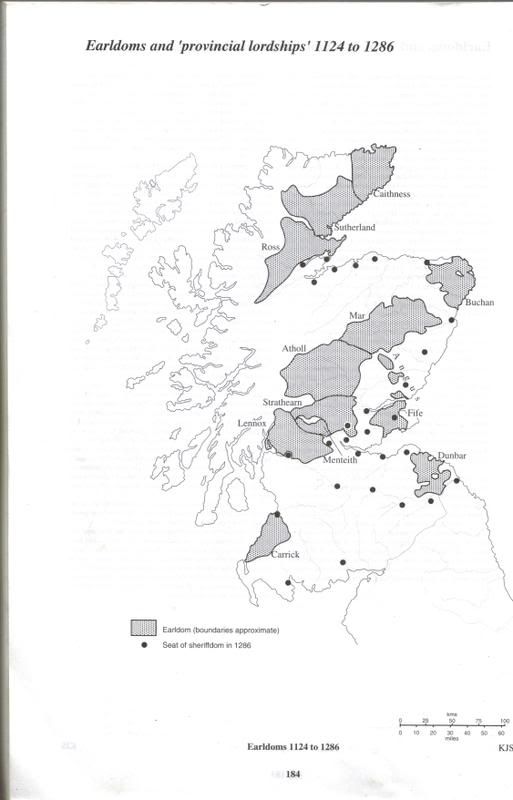
Provincial lordships were the ruler has the status of "Lord" (Gaelic "ri"; French "sire"):
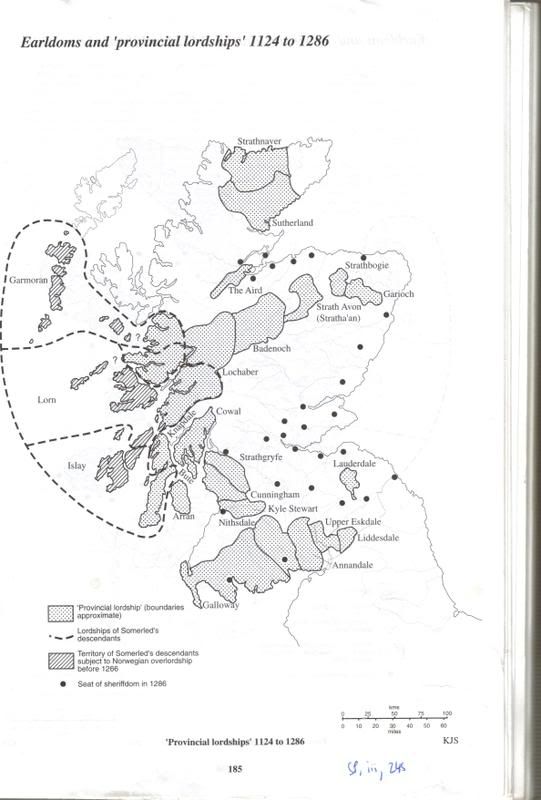
A combo of both maps. The spaces are Gowrie, Mearns, Fothriff and Moray, possessed by the king for most of the period. Gowrie (this is the Tay valley, i.e. Scone, Perth, Dunkeld, etc) is the heartland of the Kingdom. Mearns had its own mormaer in the 11th century, known because this Mael Petair, Mormaer of Mearns, was alleged to have attacked and killed Donnchad II when the latter tried to seize the kingdom from his uncle Domnall Ban. Moray was confiscated from its mormaer in the 12th century:
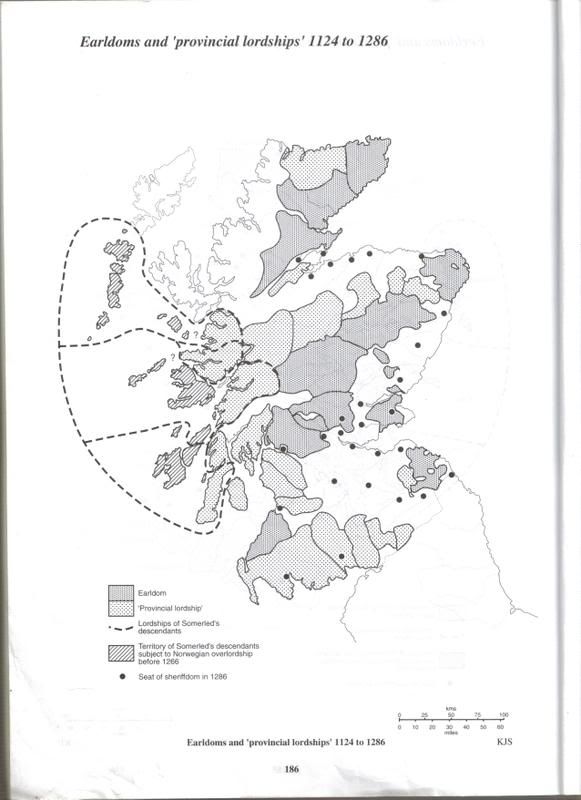
Gaelic provinces before 14th century with provincial "lawmen" (i.e Breitheamh, i.e Irish English "Brehon" or Scots English "Brieve", "Dempster"):
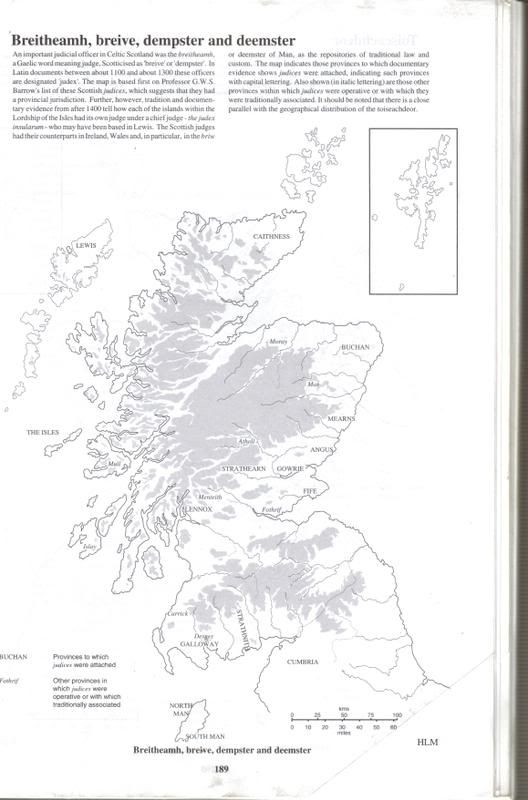
Provincial lordships before 1286 were the ruler has the status of "Earl" (i.e. Mormaer):

Provincial lordships were the ruler has the status of "Lord" (Gaelic "ri"; French "sire"):

A combo of both maps. The spaces are Gowrie, Mearns, Fothriff and Moray, possessed by the king for most of the period. Gowrie (this is the Tay valley, i.e. Scone, Perth, Dunkeld, etc) is the heartland of the Kingdom. Mearns had its own mormaer in the 11th century, known because this Mael Petair, Mormaer of Mearns, was alleged to have attacked and killed Donnchad II when the latter tried to seize the kingdom from his uncle Domnall Ban. Moray was confiscated from its mormaer in the 12th century:

Gaelic provinces before 14th century with provincial "lawmen" (i.e Breitheamh, i.e Irish English "Brehon" or Scots English "Brieve", "Dempster"):


